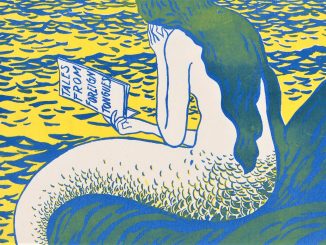![Siora Photography (@siora18), School Girl with Book [Unsplash]](https://www.thenasiona.com/wp-content/uploads/2020/02/On-Writing-1-1030x438.jpg)
It takes two trains to get to my grandma’s place, a senior center with a warm-water pool and bingo twice a week. When I arrive, my grandma’s face lights up as if it’s been years, as if I hadn’t called the day before to say I was coming. “Brooke!” she shouts, opening her arms. She hugs me and I am eight years old again.
My grandma’s hair is well-coiffed, curls airy and stiff. She stands at five feet tall, but she doesn’t stand long. Her legs aren’t as strong as they used to be and she doesn’t like using her walker. It’s a constant point of contention between her and my mom, that and the hearing aids. I let her clutch the crook of the arm and we move to the living room.
My grandma, who I don’t call grandma but rather the Yiddish word for it, Bubbie, is actually called Golda Indig. She likes Goldie better. It’s a younger, brighter name and if she has any complaints about the senior center, it’s that everyone there is old.
I sit in a chair next to the couch and pull a manuscript from my backpack, freshly bound at the 24-hour FedEx near my apartment. “Look how big,” my grandma says. The manuscript is a memoir, in part the story of her life. She asked me to write it and over the last four years, I have. It tells of the year she was imprisoned, detained in three Nazi concentration camps. She was thirteen. It tells of the years that followed, how she fled Europe, how she made a new life from scraps of the old. For most of that time, she didn’t talk about the Holocaust. She thought maybe if she ignored the memories, pushed down the pain of what happened, it would all disappear. But it never did.
On the cover of the manuscript, I’ve put both our names. They look nice together, sitting side by side. And yet, in the four years I’ve been writing—transcribing her words, finding my own—I have yet to show her what lies inside.
I flick on the lamp above us. She is lying on her side, one arm tucked under her head. She is waiting. I clear my throat. “Okay, Bubbie,” I say. “This is chapter one.”
***
When I started writing my grandma’s story, she lived in south Florida and I lived in Philadelphia. I flew down to see her, lugging my laptop with me so I could record our conversations. We sat together in her living room and she spoke not to me but to the camera in my laptop, the steady green light. She spoke of the selections she passed and the ones she failed. The woman who pulled her out of the line. The train somewhere else. The walk through winter. Her hands fidgeted as she talked, her voice rose. She had never shown me this side of her before, the side that hurt. As each memory came to her, sharp and sudden, I collected them, desperate to make the story whole. I wanted to understand what happened, to know the trauma that formed the bedrock of my family. It all came back to 1944.
After my trip to Florida, I wrote non-stop. I wrote under blankets, on my living room couch, in my bed, and on rare occasions, at my desk. I discovered what I didn’t know, where the sentences seemed to pause for more, then found those details and kept going. I curled up with my laptop hours before catching the bus to work; hours more once I got home. When my eyelids grew heavy, I went to bed. When I woke, I kept writing.
Since starting this project, nearly four years ago, both my grandma and I have moved to the Chicago area. We live less than 15 miles apart. Still, the idea of sharing what I’d written with her always made me freeze up. I didn’t know how she would respond, if my words would open old scars. If they’d create new ones. Instead of sharing, I stayed on my couch, writing and rewriting the same sentences over and over, perfecting the art of evasion. It seemed like my best move.
The couch, I should note, was a gift from my grandma when I first moved back to Chicago. She knew I could barely fill my apartment. The day after it was delivered, she left me a voicemail. “Hi Brooke. I want to know how you’re doing, how happy you are with the sofa. I hope you love it. You’re gonna think of me when you sit down!”
Can you imagine reading your grandma’s worst moments off a piece of paper and asking what she thinks? Of the sentences you used? Of the paragraphs? What kind of idiot would do that? What kind of jerk?
***
My grandma doesn’t have her hearing aids in, so I shout-read the first chapter, over-annunciating as I go. The words come out faster than I want. I describe how I see her, a bull of a woman, stubborn and sure-footed. She speaks without doubt, loves without constraint. I explain how our memoir came to be, how she wanted her story told after so many years of not telling it. How she wanted me to be the one to tell it, the grandkid who likes to write. My grandma can speak six languages, but she never learned to read or write in any of them. Everything she’s done, she’s done as an illiterate woman. Out loud, I explain how she asked me to write her story over a series of phone calls, how it took me two years to say yes.
My grandma stares up at the ceiling as I read, taking in my words. No one has ever written about her like this. No one has ever read to her like this either. When I’m done with the chapter, she nods. I can’t tell what she’s thinking, if she wants me to stop or keep going, if she wants me to explain, but finally she asks, “Are you hungry?”
I say yes and we eat.
The next day, when I’m nowhere around, my grandma calls my mom and says she doesn’t like what I wrote. No, not at all. She doesn’t understand why I would use that word: illiterate. What’s that got to do with anything? She doesn’t think anyone needs to know. My mom relays all this to me later. I am stunned. I had no idea we were still keeping secrets.
***
When I was in third grade, my mom bought Hooked on Phonics, a popular reading comprehension program at the time. I saw commercials for it on TV, kids with buckteeth and buzz cuts saying, “Hooked on Phonics worked for me!” The program came in a large white box, nearly three feet long. My mom had ordered it for my grandma.
Having learned to read in first grade, a whole two years earlier, I was thrilled when the books came to our house. I loved learning and read all the time. Immediately I assigned myself the role of my grandma’s personal reading instructor. If anyone could teach her, surely it’d be eight-year-old me.
For our first lesson, I picked three books from the box. I laid them out on our dining room table and my grandma picked the one closest to her. She peeled back the cover and started sounding out the words. I was amazed at how quickly they came to me, how automatic the process had become. I saw the whole word right there on the page. My grandma saw squiggles masquerading as sounds pretending to be words. She moved through the lines as if wading a swamp. I corrected her when she stumbled and said sweet, patronizing things like “Good job” and “You got it, Bubbie.”
We read to the end and she pulled her glasses off. “OK that’s enough,” she said. “Come, let’s make the cookies.”
I had thought we’d read more, but instead we made the cookies. We watched TV. She taught my brother and me a card trick using 21 cards. We got good at it. We all laid on the couch together. We swam in the cool blue pool in her backyard. We watered flowers in mine. I built a retaining wall. She opened a lawn chair and kept me company. She turned my favorite pajama pants into shorts. I wore them. I wore them everywhere.
Gradually and without a word, we all surrendered to her not knowing. I stopped suggesting reading lessons on her visits to see us and she never asked for them. She never had. It embarrassed her, how much she struggled, how hard it all was.
Instead, my grandma kept doing as she always had. She cooked from memory, used landmarks to navigate. She got the news by pressing the red button on her TV’s remote control. I, however, was changed. When we went out to lunch together, I would read her the menu quickly and quietly so others wouldn’t hear. She would pick the first or second thing I said. I learned to adapt to how she worked. I learned not to draw attention, not to bring up her reading skills in any way. No one else did. My family hid what we did not want to name. We buried it between us, skirted around it. The lesson had been for me.
***
A week and a half later and I am back at my grandma’s dining room table, her walker as my seat. I take a deep breath. I fiddle with the brakes.
“So I heard you didn’t like what I wrote, about not being able to read.”
“Eh, it’s fine,” my grandma says, grabbing a tissue and stuffing it up her sleeve. She likes to have them handy.
“Because I’m just trying to show how much you’ve done with so little. You know, you raised three kids, you had a long career, you…”
“Yeah, yeah, I know. It’s OK.” She looks up from the table. “You got your swimsuit?”
The topic evaporates in front of me. I pull the neck of my shirt to show a thin navy blue strap.
“Okay, I’ll get mine and we’ll go.”
She changes into her suit and we stack our towels on her walker. When we get to the pool, there’s a water aerobic class going on, four ladies lunging in the middle of the pool, but my grandma says it’s fine. “They don’t mind,” she insists.
The water is warm and the air feels like a weighted blanket. Still, I hesitate as I lower myself in. I can’t bear cold water. My grandma laughs at me. “You’re like your mom,” she says. “So scared.” She walks into the pool, no problem, no hesitation. Says hi to a few of the ladies in the class we’re interrupting.
“Are you joining us?” they ask.
“I can’t,” she tells them. No explanation.
After we swim, bobbing up and down along the wall of the pool, we change back into our clothes and my grandma lies down on the couch in her living room. I sit next to her and flick on the lamp.
Today’s chapter is about one of the concentration camps Goldie was held in, a women-only labor camp called Christianstadt. I read about the daily roll calls there; the thin, watery soup; the potatoes she’d steal, stuffing them in her pockets to share with the rest of her barrack. The chapter is a direct transcription of my grandma’s own words, a snippet of one of our conversations together. I alternate the chapters like that: her words, my words. She nods when I’m done reading and gets up.
“That’s a good one,” she says.
***
I start making trips to my grandma’s once a week. We cover one or two chapters at a time, rarely more. It’s draining for her to remember, to be reminded of everything that happened. She still misses her parents. She still thinks of her siblings and shakes her head. She lost three brothers and one sister in the war.
When I arrive today, my grandma has a piping hot plate of potato latkes waiting for me. I’m not particularly hungry, but she made them just for me so I eat a few. They’re delicious, golden and crisp, but I manage to convince her we should do a little reading too.
In the living room, I read to her about the last time she talked about her Holocaust experiences, the winter of 1997. An interviewer from the Shoah Foundation, an organization dedicated to remembering the Holocaust, had sat down with her to set her story to tape. I uncovered the video in my parents’ basement and watched it on repeat. I read out loud about this experience, how messy and tangled I found the interview. It’s almost impossible to follow. The interviewer can’t keep up with my grandma, can’t tell when she’s jumped in time or left out a detail or confused two names. My grandma oversimplifies some parts, complicates others. She doesn’t mean to, she’s just never said all this out loud before. Or in English.
I read aloud about how familiar this kind of miscommunication is to me. My grandma and I come from such different backgrounds and at times, we can barely make sense of each other. Our frames of reference are too different. She grew up with war and loss, I grew up with basketball and braces. To connect, I listen more than I talk. I self-censor, I say only what I can shout. Our phone calls only ever last three minutes, maybe four. I say these words out loud and because my grandma refuses to wear her hearing aids, I say them loudly.
“I’m impressed you remember so much,” she says when the chapter is done. She gets up to go to the bathroom and when she returns, she plops herself at the dining room table.
“How will you get home? Your dad will pick you up?”
“Yes, he is on his way,” I tell her.
“OK, I walk you down.”
She points at my backpack and I lift it onto her walker. She’s become my bellhop as of late. I grab my coat and my grandma asks me, “Do you talk to your dad in the car?”
“Yes?” I say.
“What do you talk about?”
She has never asked me this before. I realize that she heard me, she heard what I wrote.
“Oh, I don’t know. What we did that day and friends, sports, stuff like that.” I have no idea what I am saying. I am only hearing my grandma’s words again and again.
What do you talk about? She is shopping for ideas.
What do you talk about? She doesn’t know.
What do you talk about? She wants to know.
In the lobby, my grandma gives me a kiss on the cheek and waves to my dad, parked by the door. I hug her and jump in the car. It’s snowing, fat flakes that almost seem to float as they fall. As we pull away, my dad looks at me from the corner of his eye. “You got lipstick on your cheek.”
We don’t talk about friends and sports and stuff. We talk about my grandma’s question. We talk about how hard it is to connect, how hard it is to change. Trauma fixes you to a certain point, calcifies you in a certain way. Still, my grandma is trying. She is eighty-eight years old and trying to connect. I must be trying too because I did what I didn’t want to do: I showed her the side that hurt.
***
When I read the last chapter, my grandma says wow. She makes no comments about the structure or prose or any other pesky literary detail. She is just sad. She loves when I come over and assumes now I won’t. I remind her we can still swim together, we can still bake. But she already knows. Life gets busy and grandkids disappear.
We do swim, though. We swim with my brother and my nephew, her great-grandchild. Has anyone in my family ever known a great-grandchild before? He smiles at her and slaps the water, splashing us all. I take a nap on the floor of her apartment, not meaning to. We watch American Ninja Warrior and she calls one of the athletes strong in Hungarian, forgetting I don’t know Hungarian. We both laugh. When she gets tired, she lies in her bed on her side, looking out, and I lie next to her.
“When will I see you?” she asks me.
“Bubbie,” I tell her, “I’m right here.”
She rolls over to face me, smiling, and holds my hand. I don’t know what she was hoping for when we started this project, but I have a feeling it’s this: us in the same room, seeing the other. Us together.
AUTHOR

Brooke Randel is a writer and copywriter in Chicago. Her writing has been nominated for a Pushcart Prize and published in Fearsome Critters, Gigantic Sequins, LandLocked Magazine, Two Cities Review and SmokeLong Quarterly. She is currently co-writing a memoir with her grandma Golda Indig.


